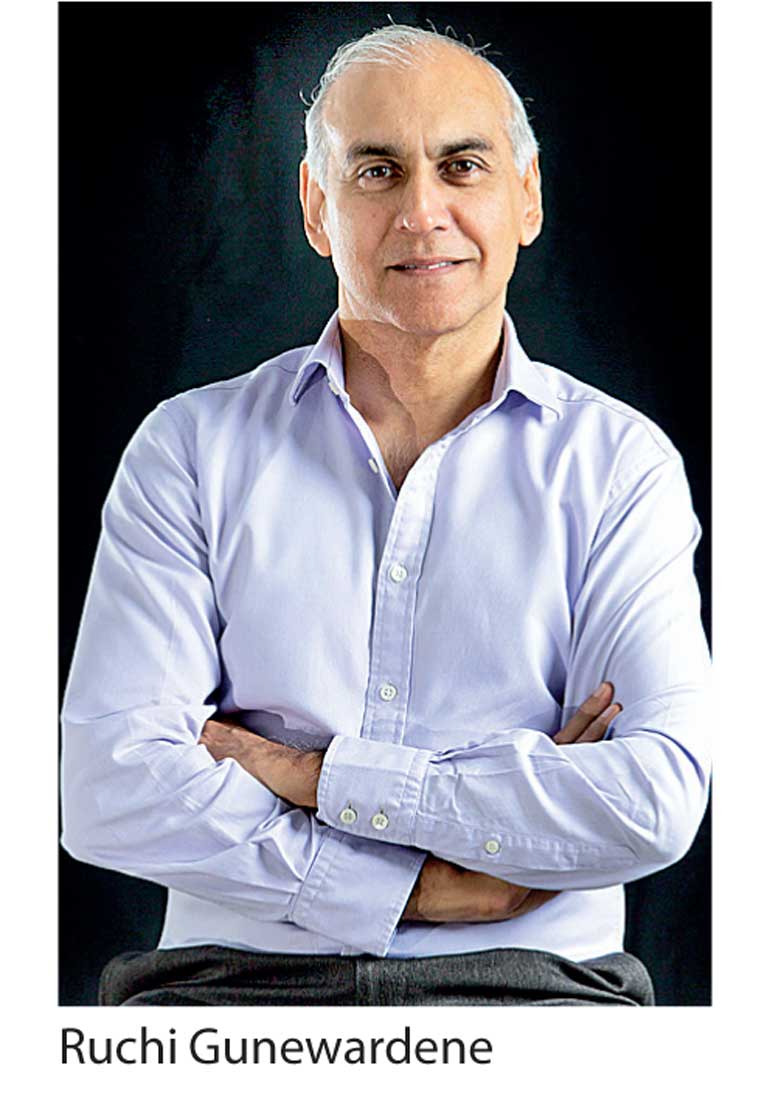Tuesday Feb 17, 2026
Tuesday Feb 17, 2026
Wednesday, 7 March 2018 00:00 - - {{hitsCtrl.values.hits}}

 Ruchi Gunewardene, Managing Director of STING Consultants and Brand Finance Lanka, provides an inspirational message to Sri Lankan exporters, based on his sector branding experience
Ruchi Gunewardene, Managing Director of STING Consultants and Brand Finance Lanka, provides an inspirational message to Sri Lankan exporters, based on his sector branding experience
A robust export market cannot just evolve without a well thought out national strategy. In most countries there are clear strategic initiatives in place, to ensure a coherent approach to taking local products to global markets.
The challenge for Sri Lanka is complex because of a multitude of factors. However, it could be boiled down to the lack of strong coherent policies which have been properly thought through and defined to benefit and strengthen the economy on the one hand with the primary beneficiary being the people (specifically the rural agricultural population) on the other.
Take the imbroglio that is raging in the oldest industry in Sri Lanka as a classic example. The 150-year-old tea industry is struggling to establish a strong foothold in global markets. On the one hand there are the proponents of making Sri Lanka the tea hub through greater liberalising tea imports for blending and eventual exports, and on the other hand, there are those arguing for the need for better protection of Ceylon Tea through more restrictive imports.
This should be resolved with a strong and clear policy direction. Instead we have two bitter factions lobbying the Government in power at any given time, to get across their point of view. As a result, we have a stalemate with no long term strategic focus for the industry. The only beneficiaries are the politicians who entertain the different groups and keep a divided industry going, with scant respect for long term economic growth, value addition, and the upliftment of the main stakeholder, the plantation worker.
On the bright side however, STING Consultants has been involved with two industries; one that is currently leading the export earnings of Sri Lanka and the other a small but dynamic power house that can lead our revenue generation and even transform the country in the future.
The success of the apparel industry
There is no better example to look at Sri Lankan global success than the apparel industry through three world class companies: Brandix, MAS and Hirdaramani.
These companies were built on the disciplined business environment of the country, going back to the early 1980s. Their long association in the sector had garnered them with considerable competence and expertise in the field of apparel manufacture. In addition, the stringent laws that prevailed ensured compliance to regulations and providing decent working conditions free of forced labour which was an issue the industry faced across many countries.
In the mid-2000s STING Consultants in conjunction with the apex industry body (JAAF) devised a brand strategy around the core capabilities of the industry, which became a uniquely differentiating factor. At that time global buyers were searching for ethical manufacturing partners because of the rise of consumer agitation following several sweat shop scandals which damaged their brands. This insight is what led to the formulation of the ‘Garments without Guilt’ brand idea, which provided significant traction in terms of PR and global acceptance whilst giving an impetus for the industry to adopt and internalise this belief system.
Since then the industry spearheaded by the leading companies have established LEED certified green factories, world class working environments and empowerment initiatives for its workers such as MAS’s ‘Women Go Beyond’ program.
The result is high manufacturing standards for the industry serving high end global brands with more complex work at above average prices. Sri Lanka Apparel is now globally known for its ethical standards and manufacturing excellence.
Today, the brand has powered the industry into global markets through not just off shore manufacturing but near-shore and in-shore investments taking Sri Lanka apparel global. In addition, MAS has collaborative research and development initiatives with world class brands such as Nike and in an audacious move have even created their own lingerie brand Amante’ which is making significant inroads in India.
The rise of the IT/BPM industry
A much more recent contributor to the foreign exchange earnings of the country has been the emerging Information Technology sector, which currently earns approximately $ 1 billion.
The sector has grown by primarily providing non repetitive work, related to complex or detailed services, often through relatively small teams servicing specialised customers. Sri Lanka IT and the related BPM industry has a small but growing foothold as a specialised niche player, very different in scale to what is offered by Indian companies.
There are many great Sri Lankan based firms who have already proved the industry’s capabilities in global markets by developing advanced IT solutions. MillenniumIT, Sysco Labs (formerly Cake Labs), WsO2, 99X are just a few of them, which have individually achieved success, but which could collectively be used to showcase the industry, along with other firms.
For a small country without an inherent scale advantage, the focus on creating a platform on skills involving complex solutions would seem to be a plausible approach to position the industry, very much aligned to the way ‘Garments without Guilt’ positioned Sri Lanka’s apparel industry’s ethical practices.
A little known company called SimCentric is a great example of what epitomises our IT industry. The company uses artificial intelligence and machine learning to create high fidelity battle field simulation middleware applications. Their products are extensively used across NATO including in the Fires Centre of Excellence at Fort Sill in Oklahoma, the US Marine Corps, US Army, US Air Force Academy, New Zealand School of Artillery and numerous other European nations.
Based on combining the capacity of working on smaller innovative solutions, solving complex problems or specialist services, a powerful and compelling brand idea through the proposition ‘Island of Ingenuity’ was adopted by the industry. This is being marketed under a broader ‘Knowledge Solutions’ platform, giving the flexibility of taking any knowledge service to global markets.
The industry has embraced the concept and are now actively working towards internalising the brand and living it through their individual companies. This is the true power of a brand, as it gains acceptance and adoption across the industry, which leads to delivering the experience by individual companies leading to customer conviction and loyalty for that company and the national industry as a whole.
The future opportunities for exporters
With these two personal experiences, the conviction of the need to take ownership of one’s destiny is more compelling than ever.
If the industry is unable to come together, then individual companies need to imbibe the spirit of what a well-articulated brand can do for them and to provide the much needed focus across the entire organisation. Living the brand and providing that consistent customer service can be a powerful tool for all our export marketing companies to adopt as they seek to take on the world.
However large or small they may be, it is the spirit of the ambition of our exporters which is the key to unlock potential and the conviction that by adopting a strategic approach to business and marketing, the world is at our feet!